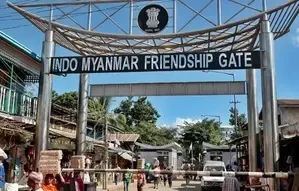Tenyimi Union Nagaland Appeals to the Government Against Border Fencing for Naga Community's Welfare

Kohima, Jan 9 (NationPress) The Tenyimi Union Nagaland (TUN), a leading organization of five significant tribes in Nagaland, has once again expressed its endorsement of the resolution passed by the Nagaland Assembly and has requested the central government to refrain from erecting a border fence along the India-Myanmar boundary to safeguard the interests of the Naga community.
TUN President Kekhwengulo Lea emphasized that the union firmly supports the resolution adopted by the Nagaland Assembly on March 1, 2024, which implored the Union government to rethink its plan to establish a fence along the India-Myanmar border.
He articulated that since many members of the Naga community reside on both sides of the border, such fencing would disrupt cultural ties, social connections, as well as access to education and healthcare.
"Communities will face isolation, severing essential links. The absurdity of this proposal is glaringly evident in the Longwa village, where the intended fence would physically divide the residence of a Konyak Angh, with the kitchen situated in India and the bedroom in Myanmar," Lea conveyed in a press statement.
Lea mentioned that during its inaugural Foundation Day, celebrated in Kohima Village in June of the previous year, the TUN resolved to support the Nagaland Assembly's resolution urging the Union government to reconsider the fencing initiative.
The TUN asserted that the proposed fencing poses a threat of further dividing the Naga populace and severing historical, cultural, and familial ties that have endured for centuries.
They remarked that the decision to construct a border fence under the guise of national security neglects the severe implications it would have on the lives and livelihoods of the Naga people.
"Families would be permanently divided, economic lifelines would be obstructed, and at-risk communities would be driven deeper into poverty. TUN represents five tribes: Angami, Chakhesang, Pochury, Rengma, and Zeliang.
The Ministry of Home Affairs (MHA) recently introduced a new scheme to issue passes to border residents of both India and Bangladesh, residing within 10 km on either side of the border, to regulate cross-border movements.
This initiative will replace the previously halted Free Movement Regime (FMR), which earlier permitted citizens living near the border regions to traverse 16 km into each other's territory without the need for a passport or visa. The governments of Manipur and Mizoram have started the process in accordance with MHA guidelines.
As per officials from the Manipur and Mizoram governments, passes will be issued to border residents once they submit government documents confirming their residence within the designated 10 km area on either side of the border.
"State police, health officials, and the Assam Rifles will oversee this system. An officer from the Assam Rifles will issue passes based on the official documentation provided by border residents. The pass will be valid for one week for specific purposes such as visiting relatives, tourism, business, medical needs, sports, official duties, border trade, attending seminars or conferences, and participating in cultural exchange programs," the official stated.
At least ten tribal organizations in Manipur, including the prominent Indigenous Tribal Leaders' Forum (ITLF), reiterated their plea to the Centre not to proceed with the border fencing and to maintain the Free Movement Regime (FMR).
The tribal organizations, in a joint statement, warned that if the border fencing is implemented and the FMR is abolished, it will become impossible to sustain the social, cultural, and economic relationships between tribal communities residing on both sides of the border.
Four northeastern states—Arunachal Pradesh (520 km), Manipur (398 km), Nagaland (215 km), and Mizoram (510 km)—share a total of 1,643 km of unfenced border with Myanmar. Among these, only fencing works for the 20 km mountainous borders with Manipur are currently in progress. The entire 1,643 km porous India-Myanmar border, notorious for the smuggling of arms, ammunition, and narcotics, is set to be fenced at an estimated cost of Rs 31,000 crore.










